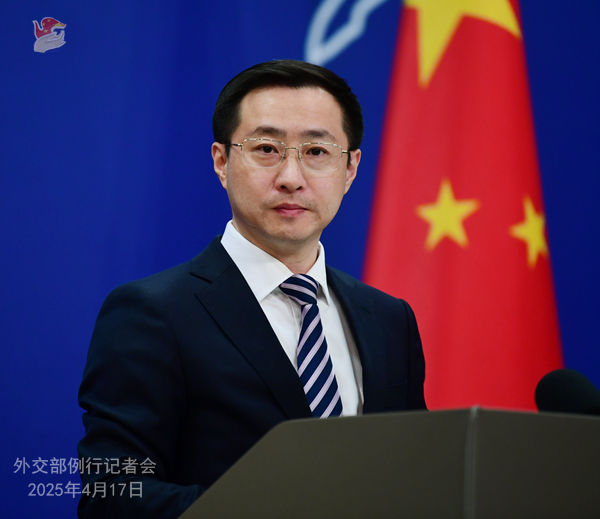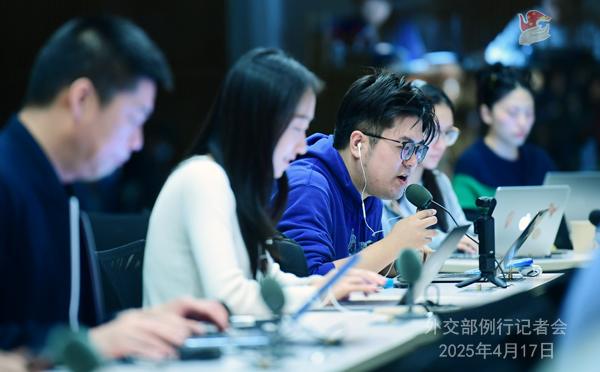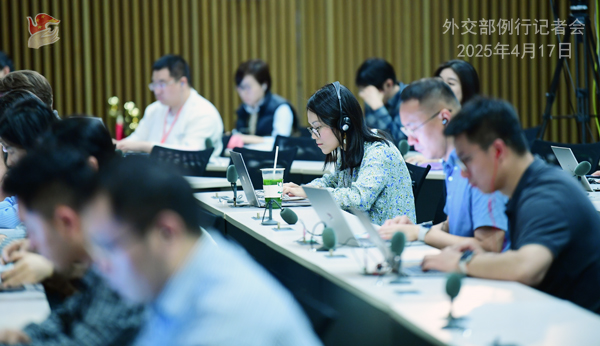
CCTV: Yesterday, President Xi Jinping concluded the state visit to Malaysia. It has been 12 years since President Xi’s last visit to Malaysia. Could you further share with us about this visit?
Lin Jian: From April 15 to 17, President Xi Jinping paid a state visit to Malaysia upon invitation. During the visit, President Xi Jinping met with King of Malaysia His Majesty Sultan Ibrahim and held talks with Malaysian Prime Minister Anwar Ibrahim. The leaders of two countries witnessed the exchange of 30-plus bilateral cooperation documents. The two sides issued a joint statement on building a high-level strategic China-Malaysia community with a shared future.
During the visit, President Xi made an important three-point proposal on building a high-level strategic China-Malaysia community with a shared future. First, upholding strategic independence and carrying out high-level strategic coordination. Both countries should continue on the development paths suited to their respective national conditions, resolutely support each other in safeguarding national sovereignty, security and development interests. A “2+2” diplomatic and defense dialogue mechanism will be established to deepen exchanges and cooperation on national security, defense and law enforcement. Second, combining forces for development and setting a benchmark for high-quality development cooperation. The two sides should work together to cultivate and expand cooperation in frontier areas and push for the transformation and upgrade of cooperation in traditional fields, and promote two-way investment. The two countries should promote rail-sea intermodal transport, upgrade “Two Countries, Twin Parks,” and turn Malaysia’s major ports into important hubs of the New International Land-Sea Trade Corridor. Third, carrying forward the friendship forged through generations, and deepening inter-civilizational exchanges and mutual learning. The two sides should jointly advance Confucianism-Islam dialogue and seize the opportunity of signing a mutual visa exemption agreement to foster closer people-to-people connection.
China always firmly supports ASEAN unity, the building of ASEAN community and ASEAN centrality in the regional architecture. During the visit, President Xi stressed that China supports Malaysia in playing its role as ASEAN Chair, and stands ready to sign the China-ASEAN Free Trade Area Upgrade Protocol with regional countries as early as possible. Together, we will reject decoupling, supply disruption, “small yard, high fence” and tariff abuse with openness, inclusiveness, solidarity and cooperation, counter the law of the jungle where the strong prey on the weak with the Asian values of peace, cooperation, openness and inclusiveness, and address instability and uncertainty in the world with the stability and certainty of Asia.
China and Malaysia are neighbors across the sea with a time-honored friendship. Our traditional friendship lasted for centuries. Last year, we held grand celebration events to mark the 50th anniversary of our diplomatic ties. As important members of developing countries and the Global South, deepening our high-level strategic cooperation is in the interest of both countries, and is conducive to peace, stability and prosperity of the region and the world. China will work with Malaysia to implement the important outcomes of this visit, brave the waves ahead and advance the high-level strategic China-Malaysia community with a shared future, and usher in the next “golden 50 years” of China-Malaysia relations. China will remain committed to the principle of amity, sincerity, mutual benefit and inclusiveness in neighborhood diplomacy and work with ASEAN countries to build a closer China-ASEAN community with a shared future.
Reuters: Do you have any more information on the Taiwanese nationals deported from Cambodia to China recently?
Lin Jian: China commends the Cambodian government for handling relevant issue in accordance with the one-China principle. We stand ready to continue deepening law enforcement cooperation with Cambodia and relevant countries to crack down on online gambling and scam, protect the safety of Chinese citizens overseas and their lawful rights and interests, and ensure normal order of cross-border exchanges between China and relevant countries.
CNR: To follow up on Kenya’s President Ruto’s visit to China, could you share with us the program and China’s expectation? How does China view its current relations with Kenya?
Lin Jian: The friendship between China and Kenya dates back to the ancient maritime Silk Road. In the new era, the two countries have established a comprehensive strategic cooperative partnership, conducted frequent high-level exchanges, deepened political mutual trust, enjoyed fruitful Belt and Road cooperation, and worked closely on regional and international issues.
This will be the first state visit to China by an African head of state since the Beijing Summit of the Forum on China-Africa Cooperation (FOCAC). During the visit, President Xi Jinping will hold a welcome ceremony and a welcome banquet for President Ruto respectively. The two presidents will have talks. Premier Li Qiang and Chairman Zhao Leji will meet with President Ruto. We believe this visit will contribute to deepening China’s relations with Kenya, carrying out the outcomes of the FOCAC Beijing Summit, building an all-weather China-Africa community with a shared future for the new era, and promoting the solidarity and cooperation of the Global South.
NHK: It is reported that China will convene an informal meeting of the UN Security Council next week to discuss the issue of the U.S. imposition of additional tariffs. Could you share the purpose of this meeting and what will be discussed?
Lin Jian: Recently, the U.S., disregarding the balance of interests reached through multilateral trade negotiations, has abused tariffs under the pretext of seeking reciprocity and fairness, which deals a heavy blow to the global economic order and the multilateral trading system, and seriously undermines the interests and well-being of all countries. Such act of unilateralism, power politics and bullying has also brought unprecedented difficulties and challenges to the United Nations and the cause of multilateralism.
We support the international community in conducting discussions through various platforms, including the Security Council, to gain a deeper understanding of the harms of unilateralism and bullying acts, reaffirm the commitment to multilateralism and the purposes and principles of the UN Charter, and build consensus for strengthening the role of the United Nations and safeguarding the legitimate development rights and interests of all countries.

Dragon TV: It’s reported that during President Xi Jinping’s state visit to Malaysia, China and Malaysia signed the mutual visa exemption agreement. What’s your comment?
Lin Jian: China and Malaysia share long-standing friendship, similar visions, intertwined interests and close cultural and people-to-people bond. During President Xi Jinping’s state visit to Malaysia, the two governments officially signed the agreement on mutual visa exemption for holders of official and ordinary passports. This move will definitely boost personnel exchanges between the two countries and bilateral interactions and cooperation in various fields, and take the building of a China-Malaysia community with a shared future to new heights.
Global Times: The Third Meeting of the National Coordinators of the Group of Friends in Defence of the UN Charter was recently held in Moscow. Outcome documents were issued after the meeting to reject the weaponization of tariffs and other trade tools and call for an end to unilateral and bullying actions. China attended the meeting. Could you share more information on that?
Lin Jian: On April 14 and 15, the Group of Friends in Defence of the UN Charter held the Third Meeting of the National Coordinators in Moscow. The meeting was attended by high-level representatives from the Group’s member states including China, Russia, Venezuela, Cuba, Belarus, Iran and Zimbabwe as well as partner countries.
The meeting issued a political declaration, which expressed serious concerns over the disruption of the multilateral trading system with the World Trade Organization at its core. It pointed out that the abuse of tariffs would have a serious negative impact on the sovereignty and development rights of countries, especially those in the Global South, as well as the international system. It opposed the weaponization of trade tools such as tariffs and called for an immediate end to unilateral measures and bullying acts aimed at conquering and controlling other countries. Parties attending the meeting emphasized that unilateral sanctions and tariff barriers are a serious violation of the purposes and principles of the United Nations. Countries in the Global South should unite as one, strengthen multilateral cooperation, jointly oppose unjust external pressure, promote the establishment of a fairer and more just new international order, and safeguard the legitimate rights of all countries to peace and development.
This meeting sent a clear message of supporting multilateralism, upholding the purposes and principles of the UN Charter and opposing unilateral coercive measures and economic bullying. It reflects the strong aspiration of the member states of the Group to reject hegemonism and power politics and uphold their interests and international fairness and justice and shows the firm resolve of countries, in particular those from the Global South, to stand together against external pressure. The U.S. needs to heed the call for justice from the international community and refrain from moving further down the wrong path of unilateralism and bullying.
Bloomberg: The UK government has raised concerns that British companies are using Chinese-manufactured drones to take high-quality images of important infrastructure in the UK. Does the Foreign Ministry have any comment on that?
Lin Jian: The Chinese government has never asked and will never ask any company to collect or store data against laws. The Chinese side firmly opposes the relevant side’s groundless suspicion and vilification against China which lack a factual basis.
The UK’s relevant department should stop turning trade into political and security issues, stop groundlessly accusing and going after Chinese high-tech companies, and make more effort that is conducive to the sound and steady development of China-UK relations.
